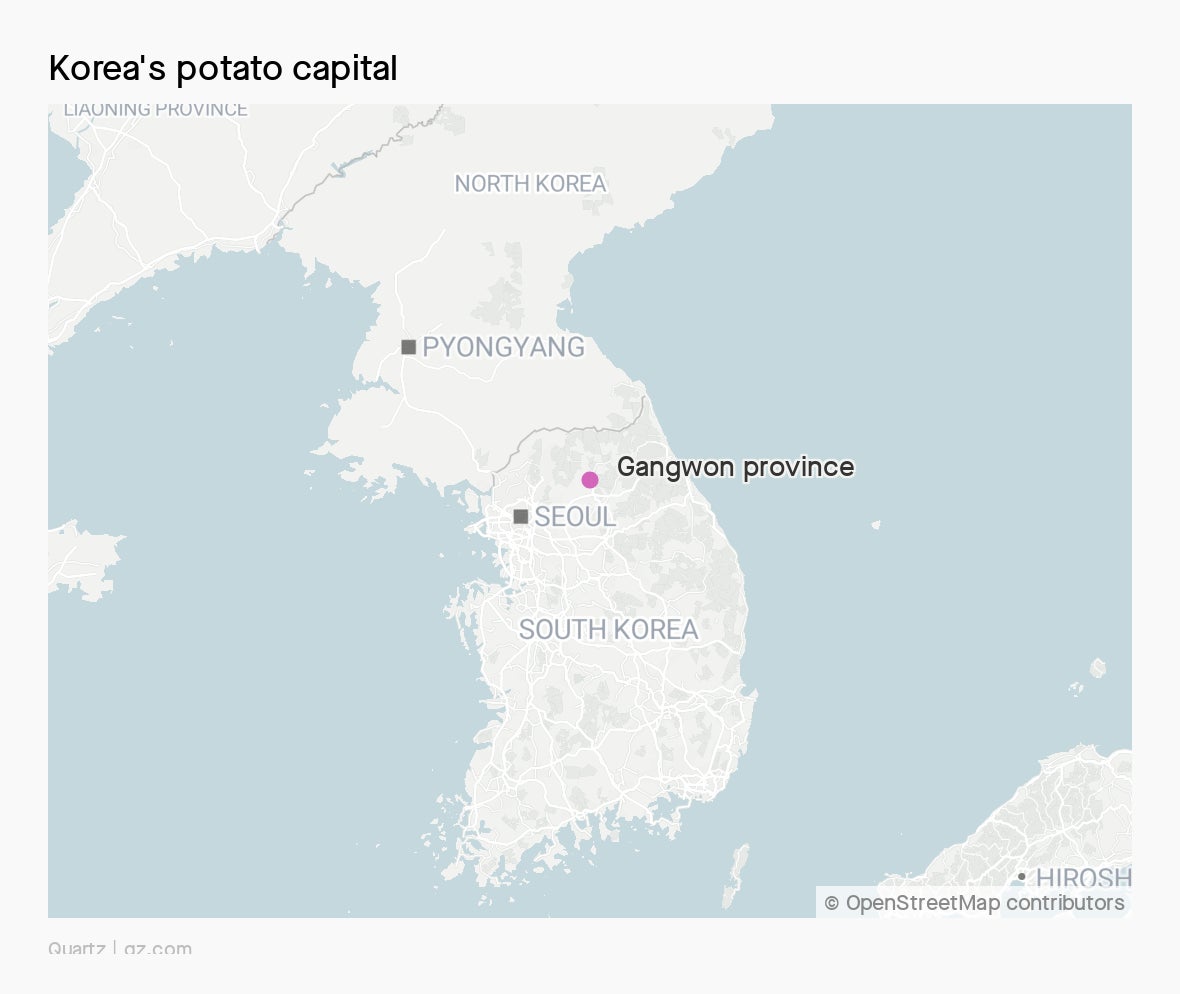South Koreans are coming to the rescue of the country’s coronavirus-hit potato farmers
Some people outside of South Korea may remember Gangwon province, located some 50 miles from North Korea, as the location of the 2018 Pyeongchang Winter Olympics. To locals, however, the cool and mountainous region is known for its firm, large potatoes that are used to produce delicacies such as dumplings and pancakes.


Some people outside of South Korea may remember Gangwon province, located some 50 miles from North Korea, as the location of the 2018 Pyeongchang Winter Olympics. To locals, however, the cool and mountainous region is known for its firm, large potatoes that are used to produce delicacies such as dumplings and pancakes.
Demand for Gangwon’s famed potatoes, however, came crashing down this year with the coronavirus outbreak, as restaurants and school canteens around the country closed down, sapping demand for the crop. According to an agricultural official in the provincial government who didn’t want to be named, some 11,000 tons (9,980 metric tons) of potatoes from last year’s harvest are in storage and risk rotting away if they don’t reach consumers before April. Farmers say (link in Korean) prices have fallen to a level that allows them to make only razor-thin margins.

Provincial governor Choi Moon-soon spurred to action and put out a call on Twitter on March 11 for people to support Gangwon’s potato farmers. In partnership with the local farmers’ guild, the government launched a heavily discounted campaign online (link in Korean) for Gangwon potatoes, offering 10 kilograms (22 lbs) of potatoes for just 5,000 won ($4), with shipping costs covered by the province. The price is less than a third of retail prices at grocery stores.
“Let’s eat clean potatoes and knock out the coronavirus! Press the link no matter what!” Choi exhorted in the tweet.
The campaign also featured a promotional video (link in Korean) of Gangwon’s new mascots—a white tiger and a black bear who are supposedly the offspring of the Winter Olympic mascots Soohorang and Bandabi—picking and boxing potatoes for the online sales. Choi even created (link in Korean) an abbreviated term for the word potatoes, “PTS,” as part of his social media campaign, a reference to K-pop supergroup BTS. He wrote in a tweet that the “similarity” between BTS and PTS is that the former is a group loved all over the world, while PTS is a vegetable found all over the world.
Choi’s campaign worked. The website’s server crashed on the first day the site went live on March 11, according to local media reports. The online shop later increased its maximum order capacity from 1,400 to 8,000 boxes of potatoes a day, with the goods quickly selling out again the next morning. The potato frenzy has even spawned a new term—“pocketing,” or “potato ticketing,” referring to the competitive ordering process. Some, discouraged by their “pocketing” failures, even called on Choi to implement something akin to Korea’s national face-mask rationing program.
South Korea has over 8,000 reported cases of Covid-19, though new cases have started to slow in the past week. On Feb. 28, the government announced it would inject over $13 billion to bolster spending and provide tax breaks, especially for small businesses. President Moon Jae-in promised further stimulus and safety net measures in a cabinet meeting today, calling the current situation “worse than the 2008 global financial crisis.” Schools in Korea remain closed until April 6 at the earliest.
Jang Eun-mi, a 36-year-old restaurant owner in the southern seaside city of Busan, was able to buy three boxes, and shared photos of the goods to her Instagram.
“Being a small business owner myself, I can’t imagine how hard it must be for the farmers to throw away their potatoes because of the coronavirus,” Jang told Quartz. “Also, as a consumer, it’s lovely that I can get such quality potatoes at a low price.”
Even some people outside of the agriculture industry are benefiting from the potato fire sale. Kim Seong-ho, the owner of a small business in Gangwon which specializes in local dishes made from potatoes, tweeted (link in Korean) to the governor saying his online store had a huge increase in sales a day after the potato sale started.
Gangwon isn’t the only Korean province launching promotions to help its embattled farmers. Gyeonggi province, which surrounds Seoul, sold 7,200 vegetable baskets (link in Korean) from eco-friendly farms originally contracted to supply school canteens in under two hours online.
According to Gangwon’s governor, the province will continue with its sales campaign until it shifts all the potatoes that are in storage. So far, some 480 tons have been sold online, the rest through traditional market channels. But not all farmers are happy with the arrangement.
“Because of the aggressive marketing by the Gangwon provincial government, consumers now consider 5,000 won as a reasonable price level for 10 kg of potatoes,” a farmer in Chuncheon, the provincial capital, told Yonhap News Agency (link in Korean). “Quality potatoes are being traded at over 10,000 won per 10 kg in the wholesale market right now. People might not buy them because that seems expensive in comparison.”
According to the Gangwon agricultural official, there are still 7,400 tons of potatoes left to sell.